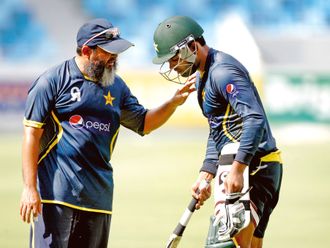Dubai: It was a shameful procession from the Indian batsmen at The Oval where they crashed to an innings and 244-run defeat to England on Sunday. The highly acclaimed Indian batsmen lasted only 61.1 overs in the first innings and a mere 29.2 overs in the second innings at The Oval and succumbed to their third heaviest defeat ever.
Ardent cricket fans are searching for answers behind India’s 3-1 series defeat to England as the two Tests that they lost were by an innings and another by 266 runs. Was it due to lack of commitment from the players that led to such an abject surrender or are the players technically weak to play abroad? A statistical study on India’s performance abroad proves that they deserve the tag of home ground bullies.
The Indian cricketers’ love for playing in the shorter version of the game and the cash-rich Indian Premier League (IPL) is again being questioned.
It also seems that mentally, India’s present cricketers are not strong enough to cope with pressures and that the Ravindra Jadeja-James Anderson row did affect the team.
Indian skipper Mahendra Singh Dhoni’s captaincy skills was also below par and it is clear that coach Duncan Fletcher is incapable of correcting the technical flaws and also in imbibing confidence in his players.
The Board of Control for Cricket in India (BCCI) should also accept the blame for a schedule which hardly had any matches for the players to acclimatise to English conditions by packing five Tests in 42 days.
Here’s a look at the five main reasons behind India’s defeat:
Pathetic batting display
India’s top order, who were hailed as some of the finest batsmen in the game, were totally exposed. The average opening stand was just 21.90. Shikhar Dhawan showed that he lacked temperament to play Test cricket against moving deliveries, Gautam Gambhir appeared like he was no longer the classy strokemaker he was and Murali Vijay showed he lacked consistency.
Virat Kohli, who was hailed as successor to Sachin Tendulkar is filled with technical flaws and lacks determination. Cheteshwar Pujara too cannot be considered as successor to Rahul Dravid. Kohli and Pujara, who were supposed to be the backbone of Indian batting on this tour, recorded a combined average of just 17.80.
Bowlers had no clue
India’s bowling strength is among the weakest among Test playing nations. They had no clue to use the English conditions — be it spinners or pacers. Ishant Sharma’s injury after his stupendous performance in the Lord’s Test hit the team badly. Bhuvneshwar Kumar is promising but he could not get any support from other bowlers.
India’s poor batting also put immense pressure on the bowlers as they were bowled out for under 200 five times in a row. It was Indian spinners’ worst show. England spinner Moeen Ali, by emerging as the second highest wicket taker of the series, showed the Indians that he is superior to them in utilising the conditions.
Sleep fielders?
Every Indian cricketer knew the dictum that catches win matches but they repeatedly dropped catches — especially in the slips. In this series, it would be ideal to have called them India’s “sleep fielders”.
Everyone is aghast at what India’s fielding coach Trevor Penney, who has been hired for a huge salary, has been doing to sharpen the fielders. Incidentally at a press conference when he was asked about the reason he had the cheek to say that the slip fielders have no problem and that every team does drop catches.
Ravindra Jadeja dropping a struggling Alastair Cook on 15 in the third Test at Southampton was undoubtedly the turning point of the series as he went on to crack 95, regained form and England thereafter raced to repeated victories.
Jadeja-Anderson bust-up
The Ravindra Jadeja-James Anderson row benefited the England team. It was an incident intended to disturb the focus of the Indians from the game and they succeeded in it. Anderson has candidly admitted that the incident helped him a lot as he could focus more to perform on the field while the Indians were shaken by the incident.
With Anderson being let off without being punished, it affected the Indian players who were mentally not strong enough to handle the situation. On a tough tour like England they should have taken Paddy Upton, the mental conditioning coach who helped Indians immensely during the 2011 World Cup.
Dhoni’s lack of vision
Mahendra Singh Dhoni’s captaincy lacked sharpness during this series. He kept on picking the wrong combination and committed many blunders on the field. Whether due to the pressure or not, his wicketkeeping was also poor. His captaincy record outside India is so pathetic as he may soon get the dubious distinction of becoming the Indian captain who has lost must number of Tests abroad. His stock answer after every series defeat that it has been a “learning curve” has started to irritate the fans now.
The BCCI’s lack of vision to improve Indian team’s performance abroad and refusal to make England or Australian type of wickets in India has also contributed to India’s repeated failure abroad. Unlike in the past, Indian cricketers, in their enthusiasm to play in the IPL, do not opt to sharpen their skills in English Counties — like in the past.
India may remain only kings at home but repeated failures like this can result in India losing its position as the country that generates 70 per cent of the world revene to the game.










